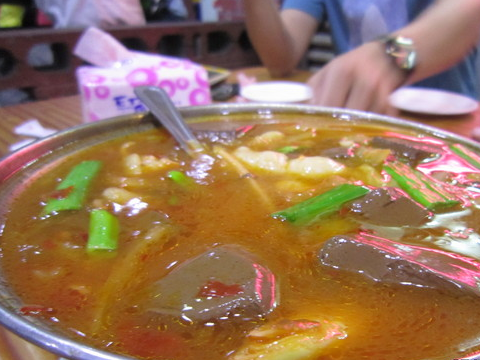People with poor liver health are prone to becoming weak, so it is important to pay attention to maintaining one’s own health and not wait until diseases occur before seeking treatment. Preventing in advance is the right approach. According to traditional Chinese medicine, the root cause of all diseases originates from the liver. If the liver’s metabolism is not normal, the body’s required nutrients cannot be supplied in a timely manner, causing organs to function improperly. The liver is the body’s detoxification factory. Toxic substances from food and drinks, harmful medications that damage the liver, as well as toxins and waste produced in the body must rely on the liver for detoxification. If the liver fails to detoxify properly, toxins will stay in the body, and women may develop a “yellow face” in the US. Physical weakness, headaches, and nausea are all signs of poor liver health. So, what foods can be eaten to prevent liver diseases?
Pork blood, also known as liquid meat, blood tofu, and blood curd, tastes sweet and bitter, with a warm nature, and has detoxification, intestinal cleansing, blood nourishing, and beauty-enhancing effects. Pork blood is rich in nutrients such as vitamin B2, vitamin C, proteins, iron, phosphorus, calcium, and niacin. According to ancient herbal texts, pork blood tastes salty, has a neutral nature, and is mainly used to promote blood production, relieve miasma, treat strokes, injuries from falls, fractures, headaches, and dizziness. Pork blood has detoxification properties and can be used for strokes, dizziness, abdominal fullness, severe joint pain, and festering sores. It has long been known in China that consuming pork blood and blood from other animals can cleanse impurities in the body. Regularly consuming pork blood soup helps maintain liver function. Pork blood and pork liver soup – Ingredients: 300g pork blood, 50g pork liver, 50g peanuts, 2 anise seeds, 4g salt, a little white pepper powder, a section of scallion, 10 ml vinegar. Method: ① Wash the pork blood and pork liver. Cut the pork blood into 1 cm square pieces and the pork liver into thin slices 3 cm wide and 4 cm long; wash the peanuts, soak in warm water for 1 hour, remove and place in a bowl. ② Heat 10g of oil in a pan, add the anise seeds and minced scallion, fry until golden, emitting fragrance; stir-fry the pork blood chunks and liver slices in the pan until cooked; add 1000 ml of water, simmer for 10 minutes; add the peanuts, simmer for another 10 minutes; add salt, white pepper, vinegar, bring to a boil, then remove from heat. Pork blood and pork liver soup has the effect of nourishing blood and benefiting the liver. It is suitable for symptoms of dizziness, pale complexion, palpitations, shortness of breath, decreased appetite, fatigue, and weakness caused by anemia.
Lychee tastes sweet, sour, and warm, enters the heart, spleen, and liver meridians; it can stop hiccups, treat diarrhea, and is a good diet remedy for persistent hiccups and frequently loose stools. It also helps brain health, strengthens the body, stimulates appetite, and benefits the spleen, promoting appetite. Due to its warm nature, excessive consumption can lead to excessive heat. Lychee wood is strong, with elegant grains, durable, and has always been considered a premium material. Lychee has the function of strengthening the liver and pancreas, with remarkable effects on enhancing energy and blood. Lychee nourishes brain cells, improving insomnia, forgetfulness, and excessive dreaming, and can promote skin cell renewal and delay aging. However, it is best to drink a little saltwater, herbal tea, mung bean soup, or soak fresh peeled lychees in diluted saltwater in the freezer before eating them. This not only prevents internal heat but also aids digestion. Drinking brewed water from lychee shells can relieve lychee heat. However, excessive lychee consumption can cause nosebleeds or toothache, and can lead to overheating. Also, lychee should not be consumed on an empty stomach, and people with diabetes should be cautious in consuming them.


